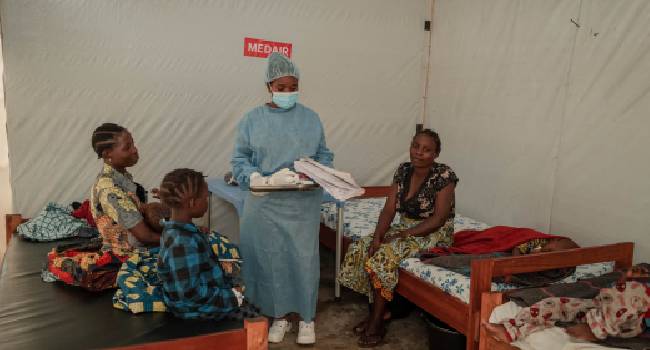Health
Mpox Cases Surge in DR Congo as Country Awaits Vaccines

Mpox cases are on the rise in DR Congo as the nation faces delays in vaccine distribution, heightening concerns about the spread of the disease.
According to the health minister’s statement on Monday, there has been an increase in Mpox cases and fatalities within the Democratic Republic of Congo (DRC), while awaiting vaccine supplies from both Japan and United States.
According to Health Minister Samuel-Roger Kamba, the toll for this year has increased from 16,000 cases and 548 deaths within a few days to 16,700 cases and slightly over 570 fatalities.
During a press briefing, Kamba revealed that the World Health Organisation (WHO) had requested affected nations to enhance their vaccination initiatives in response to a more dangerous variant of mpox. Kamba emphasized the significance of this situation as it is being considered a continental emergency.
On Wednesday, the World Health Organization announced that the outbreak of mpox in Africa has become a worldwide public health crisis. Since July, incidents have occurred in Burundi, Kenya, Rwanda and Uganda. In addition to this update from WHO comes news that there is also one confirmed case of this new strain present within Sweden.
As per an anonymous medical source who spoke to AFP, the USA has committed to providing 50,000 vaccine doses for DRC. Additionally, Japan has agreed on Monday to send a total of 3.5 million shots exclusively meant for children in need of vaccination.
According to the source, DRC plans on vaccinating a total of 4 million individuals which would include approximately 3.5 million children.
“I am hopeful that we will see the vaccines arriving by next week,” said Kamba.
He encouraged people to get vaccinated, stating that it is a resolution for our predicaments.
We are prepared with our vaccination plan, but the arrival of the vaccines is pending.
In a country with approximately 100 million people, instances of the illness have been reported in each of its 26 provinces.
The highest alert category of the WHO has been declared for the outbreak, which is now considered a public health emergency of international concern.
Updated guidelines were released on Monday to counter the surge, emphasizing “the need for agile adaptation of immunization strategies and plans in areas that require attention.”
The statement urged nations to intensify their endeavors in fully probing instances and incidents of mpox ailment, comprehending its dissemination, and curbing the propagation “among households and communities.”
According to the statement, health officials are required to report fresh mpox cases every week and they must “detect, observe and assist in tracing individuals who have been exposed to those infected with the virus in order to prevent its spread.”
The statement emphasized the need for countries to be prepared in offering food and other forms of assistance to individuals affected by mpox. This includes, when feasible and appropriate, placing patients in care centers for isolation purposes as well as providing direction on how to provide home-based care.
According to the WHO, there needs to be increased “cross-border collaboration” in order to detect and manage potential cases of mpox without implementing unwarranted travel or trade restrictions that might negatively affect local, regional, or national economies.
According to Kamba, mpox is increasingly reaching a larger number of young people in DRC, with many children under the age of 15 being impacted.
According to the African Union health agency’s report on Saturday, a cumulative number of 18,737 malaria pox suspected or confirmed instances have been recorded in Africa since the start of this year. This statistic also includes one week with around 1,200 cases reported.
The virus, once known as monkeypox, was first identified in 1958 within monkeys used for experimentation in Denmark.
The DRC, which was formerly known as Zaire, saw the first instance of its discovery in humans back in 1970.
The virus that leads to Mpox is transmitted from infected animals, but it can also spread between humans through close physical contact.
The illness results in elevated body temperature, bodily discomfort and prominent skin eruptions resembling boils.
